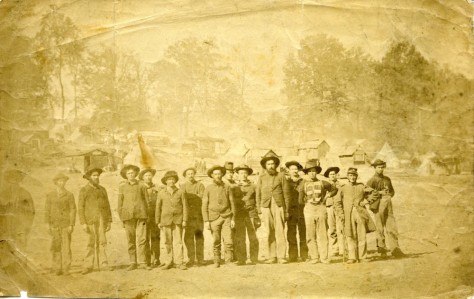This letter was written by Oliver Willard Smith (1840-1881) who mustered into Co. F, 13th Illinois Infantry on 24 May 1861 and mustered out on 18 June 1864 after three years service. Oliver was the son of Curtis Smith (1811-1881) and Lucy Willard (1817-1871) who came to Mayfield, DeKalb county, Illinois, from Vermont in 1840.
The 13th Illinois was nicknamed “Fremont’s Grey Hounds.” In June 1861, the regiment was ordered to Caseyville, Illinois, and by July 5, had arrived at Rolla, Missouri, where it remained until the spring of 1862. While stationed at Rolla, the regiment was deployed to guard the supply trains to and from General Lyon’s army, from guerrilla bands in that part of the state. The Thirteenth was also part of General Fremont’s force that went to Springfield, Missouri, in the fall of 1861. In 1862 the regiment joined General Curtis’ army at Pea Ridge, Missouri, 250 miles southwest of Rolla, in his march from Pea Ridge to Helena, Arkansas, on the Mississippi River. The regiment was part of General Sherman’s army in his attack on Chickasaw Bayou. The Thirteenth was also present at the capture of Arkansas Post, and was successful in a raid in Greenville, Mississippi.
After the war, Oliver married Esther Stilwell (1844-1933) and moved to Boone county, Iowa, where he died at the age of 40.

TRANSCRIPTION
Woodsville, Alabama
April 17, 1864
Cousin Edwin,
Thinking it about time to write you, I will improve a leisure moment in doing so. It is needless for me to say that I have delayed answering your letter rather long and useless for me to try to excuse or apologize for myself in any way, but without joking, our duty for the last six weeks is not to be sneezed at. They are just more than tucking the essence of soldiering to us before we leave them. It seems thy are very eager to embrace their last opportunity to impose all the duty on us possible. Even our own petty officers—realizing the shortness of their reign and over-estimating their importance, forgetting for the time that they ever sawed wood or done anything inferior to that which their present rank would indicate for a living—seem to delight in imposing on the boys in every way possible.
One of the strongest reasons why the 13th did not re-enlist was on account of the dislike and disgust of many of the officers that have been forced upon us without our consent. I have become utterly disgusted with the system which supports so many contemptible specimens [of] humanity. It is a lamentable fact that one-half of the line officers in our army today was not—when in civil life—considered suitable or competent to hold the office of postmaster. Still there are, of course, many exceptions to this among our officers—men who do not abuse the office that some disgracefully and shamefully do. I do not wish to speak disrespectfully of the men who compose our army for in aggregate, it has never been surpassed by any army of equal magnitude.
It is a consolation to me to know that I have nearly finished the period in which I bound myself to serve my country and obey the sovereign will of my superiors in rank. I expect there has been quite a change in things in general in Old Dekalb since I left. Yet I think there remains enough of the original for me to recognize it.
You may look for a time in the North this fall that has never before been her lot to witness. I anticipate a general time up there in the fall. The Copperheads will do their prettiest [to] have their own way but they will meet with disappointment. I will not trouble you with any more of this at the present time. My respects to all your folks &c. Write soon as convenient. I remain as ever, your cousin, — Oliver W. Smith



One thought on “1864: Oliver Willard Smith to Cousin Edwin”